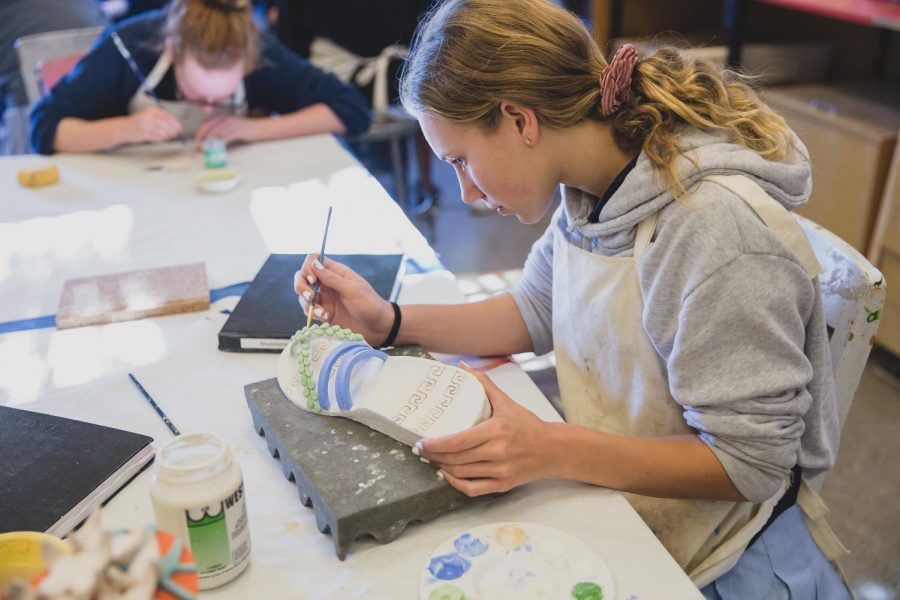How Casti students cope with stress
Relaxing activities, such as painting, listening to music, and more, can be extremely helpful to the de-stressing process.
I think we can all say that, without a doubt, this past year has been stressful. From switching between online learning and in-person school to figuring out how to maintain relationships distantly, the COVID-19 pandemic has certainly thrown a wrench in all of our lives. Due to the isolating environment of COVID-19, the number of people experiencing mental health issues has risen dramatically, both worldwide and within every age demographic. Around 1 in 5 people in each generation (Gen Z, Gen X, etc.) has reported that their mental health has worsened from the year before. According to the American Psychology Association, 2 in 3 Americans have begun experiencing sleep issues, and the CDC has reported that rising stress levels have triggered negative coping strategies as well, such as drinking or withdrawing from relationships.
In the past couple of weeks, I’ve talked to various Casti students about their own mental wellbeing, particularly regarding stress. For all of them, this pandemic has exacerbated their stress and especially school-related stress. When I talked to Sara Baudler ‘23, Anja Peterson ‘22, and Ella Holsinger ‘23, all of them cited schoolwork as the main cause of their stress. Baudler referenced how the pressure of the school’s culture to “do everything and be good at everything” was starting to hit her harder as she got older, and Peterson added that “it feels like every little piece of schoolwork could be the deciding factor of where you go to college.”
Ms. McCracken, a Castilleja school counselor, said that she has noticed that this past year has been draining for students in a different way than previous years. This is because many coping mechanisms and strategies used by students, such as seeing friends, have shifted or disappeared due to the pandemic. In general, this year has been a very isolating time for everyone, which Ms. McCracken summed up by saying “everybody is going through this collective trauma.”
In order to cope with the increase of stress the pandemic has brought on, students have turned to various strategies to de-stress, from reading to taking a run. Every student that I talked to agreed that distraction (mainly from schoolwork) has helped them with de-stressing, and Reece Sharp ‘24 suggested trying to “Just pretend you don’t exist for a little bit. Lie in bed, and try to clear your brain,” and Holsinger also said, “I love to distract myself,” when asked about trying to de-stress.
Additionally, releasing your emotions is another strategy that many students suggested, especially through simply crying it out. Lila Bock ‘21 agreed, saying that “crying is so underrated” as a de-stressing strategy. Given that this year has been online, others have turned to strategies involving the internet. For example, Emma Chu ‘24 suggested “[watching] YouTube scenery videos,” and Michelle Leonard ‘24 said that she “sometimes [plays] action games to get [her] aggression out.” Personally, I have been using an app called Woebot, where I do daily check-ins with an AI chatbot. I’ve learned different ways to cope with my emotions and stress through the mini-lessons Woebot provides as well.
If you are feeling more stressed and anxious than you’ve been before this year, you are not alone. If you haven’t already found strategies that work for you or want to explore more options, I have compiled some easy, student-recommended ways to help you de-stress. Please remember that some of these strategies may not work for you, but I hope that you can find some that do.
- Make time for yourself
- Watch your favorite show or YouTube channel
- Read a comfort book
- Listen to music
- Go out for a drive (if you can)
- Pamper yourself (think skincare, snacks, and more)
- Sleep or rest
- Take a nap
- Try to get off a screen before you go to bed
- Lie down somewhere are rest
- Move your body
- Get some fresh air
- Take a walk
- Go for a run
- Do a short workout
- Connect with others
- Organize a time to meet up with people in person
- Zoom or FaceTime with a friend
- Text or call someone you want to reconnect with
- Other
- Cry it out
- Journaling or bullet journaling
- Try out the app Woebot
- Practice gratitude (write down 3 things you’re grateful for)
These are all great ways to relieve stress, but if you feel like you’ve been struggling a lot more and need additional help, some students recommend visiting a school counselor. An anonymous student I talked to cited the Castilleja counselors as “the most underrated Casti resource.” If you are a Casti student, the counselors’ offices are on the third floor of the ACE center, and you can learn more about how to contact one of them here. However, as summer approaches, school is also ending soon. If you feel like you need additional support over the summer, talking to the school counselors about ways to find support outside of school may help.
Despite the fact that the amount of school stress for students will decrease over the summer, many of us sadly won’t get the same amount of social interaction as before. However, there are various ways you can take advantage of summer to de-stress as well. Ms. McCracken recommended “taking summer as an opportunity to do things that fill you up” or “diving into an interest you have that you may not have time to do during school” in addition to continuing to socialize with friends, family, and more. As a reminder, the strategies listed above do not apply to the school year only and can be used for all occasions, including summer.
I hope you find some of these strategies for de-stressing useful and have a great summer!

Claire Wong '24 is a staff writer for Counterpoint. When she has free time, she enjoys doing archery, reading, and writing poetry. Claire also loves geeking...


